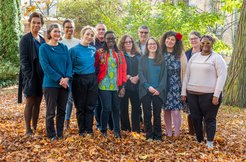Workshop Report “Gender, Migration, and Social Mobility among Transnational West African Women”
The inaugural workshop of the Otto-Hahn Research Group “Gender, Migration, and Social Mobility among Transnational West African Women”, convened by Anaïs Ménard and Jacqueline Knörr, was held at the Max Planck Institute for Social Anthropology on 26–28 October 2022.

Moving ahead
This event brought together an international group of social scientists to investigate the experiences of West African migrant women in Europe and the challenges they face in contexts increasingly characterized by socioeconomic crises. Drawing on various case studies (from Cameroon, the Gambia, Ghana, Guinea, Senegal, Sierra Leone), workshop participants discussed the strategies that West African women employ to establish their livelihoods abroad, access various economic and social assets, and implement projects and businesses ‘back home’.
Transmission and performance
A central theme was the transmission and performance of social status, as workshop participants investigated the resources through which female West African migrants acquire capital in social, economic, and symbolic terms. They explored the strategies female migrants employ to deal with the multiplicity of constraints they face in connection with gender and race, underlining the connection between individual capacities to adapt to different sociocultural environments and the conditions of (migrant) life in the host society. Performing social mobility was found to be important in countries such as France, where possibilities for upward social mobility have decreased over the past twenty years and migrants have increasingly been at risk of losing their hard-won achievements and facing precarity. Contributions highlighted the material but also emotional and affective ‘labor’ involved in strategizing for social mobility (both in home and host countries). The case of Gambian women in the United Kingdom illustrated how they deploy individual long-term strategies across borders and generations. Family relations as well as friendship and professional ties were explored as key elements of migrants’ efforts for social mobility, as in the case of Cameroonian women in Germany. Presentations about migration to Germany also opened discussions about processes of racialization in women’s lives, involving the realization and effects of having become ‘black’ upon arrival in Europe.
Return migration and investing ‘back home’
The workshop highlighted women’s repeated movements between Europe and West Africa during different phases of their lives and the complexity of the experience of return migration. As women acquire socioeconomic, educational and symbolic capital in Europe, they also use these assets to gain status ‘back home’. Workshop participants discussed how migrant women trained abroad may initiate social innovation in their countries of origin, for example by establishing private care businesses such as nursing homes in Ghana. Another paper investigated the involvement of Guinean women in second-hand clothing businesses and the resulting higher status that these women derived from their newly-acquired wealth. A further case study examined Ghanaian women who migrate to Middle-Eastern countries such as Dubai and the particularly high risk of failure and exploitation this involves.
Becoming middle-class?
Another major topic of discussion was the relevance and usefulness of ‘middle-class’ as a category reflecting female migrants’ experiences. The papers demonstrated that West African migrant women are not a homogenous group; they are situated in varied professional contexts and face different economic challenges due to differences in socioeconomic and educational backgrounds and contexts of migration. Individual strategies were aimed at securing and maintaining one’s hard-gained capital and at advancing one’s social status. In many cases, however, strategies focused primarily on avoiding failure and precarity. Among many migrant women, having a high status in diaspora networks does not necessarily reflect belonging to a European ‘middle-class’. Migrants often find themselves in a paradoxical situation: they may be able to achieve a relatively high status back home and in diaspora networks, while having a relatively low income and status in their host society.
